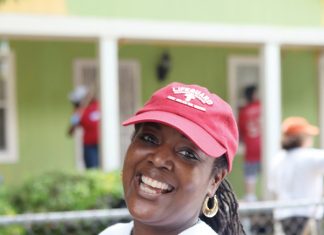Ponce City Market
On August 2, 1926, Sears threw a party and 30,000 Atlantans showed up, frantic to peek inside the new 750,000-square-foot retail center on Ponce de Leon Avenue, where all of the 35,000 items in the iconic Sears Roebuck catalog were on display. “If ever there was a doubt in the minds of Atlantans that the company actually kept in stock the thousands upon thousands of articles . . . that doubt was erased after a tour through the building,” enthused an Atlanta Constitution reporter. It was built in a record six months by more than 2,000 workers, and Sears pumped $2 million into the construction job market. That’d be $26 million today; no wonder Mayor Walter Sims was on hand to hoist a flag atop the 232-foot tower.
The Imperial Hotel
On a Monday in June, 25 years ago, activists broke into the vacant Imperial Hotel, made their way to the highest floor, and lowered a massive sign emblazoned with the directive: “House the Homeless Here.” Soon the encampment inside the historic hotel numbered 100 protesters.
The Coretta Scott King Young Women’s Leadership Academy
Founded in 2007 as the only all-girls unit of Atlanta Public Schools, the academy stresses science, technology, engineering and math courses. The first seniors graduated from the school this spring, and every single one was accepted to college.
Lew Oliver
From Vickery Village in Cumming to pastoral Serenbe, Lew Oliver has been metro Atlanta’s New Urbanist trailblazer for more than a quarter century. But the versatile housing designer—who now master-plans full communities—calls a massive undertaking in Fayetteville, Pinewood Forrest, his most inspiring project yet.
The Proctor Creek Project
The movement to rejuvenate Proctor Creek and the neighborhoods through which it snakes involves a coalition of federal, state and local agencies—along with nonprofits, city planners, and private investors.
Fugees Academy
Fugees Academy grew out of the acclaimed soccer program for refugee children. Today, the school enrolls 100 students from more than twenty countries, helping them thrive as they make the transition to a new home. Thanks to donations and sponsors, tuition is free.
K. Rashid Nuri
Nuri's urban farms bring fresh food to areas of Atlanta where rubble, history, and poverty are cross-pollinated.
Gene Kansas
Gene Kansas has an affinity for adaptive-reuse projects, especially those on imperiled Auburn Avenue, the heart of a district famously dubbed Sweet Auburn when it was thriving during the first half of the 20th century. Kansas knows how fragile community and history can be, having seen his hometown literally underwater.
The Atlanta BeltLine
In the center of an old railroad bridge in Reynoldstown, a man pedaled a unicycle, arms outstretched. An odd-looking chap, he had spindly fingers made from motorcycle foot pegs and a red taillight heart that gleamed, E.T.-like, under horseshoe ribs. Visitors to last year’s Art on the Atlanta BeltLine exhibition could bring him creaking and clacking to life with a separate set of foot pedals. Will Eccleston’s Uniman is gone now, dismantled in the artist’s backyard, just as the overgrown grass and rusted tracks will someday be transformed. But for a moment, Uniman was part of an unfolding history.
HouseProud Atlanta
The small Chosewood Park nonprofit has aided more than 700 low-income seniors since 1992. It provides home maintenance and repairs—everything from new toilets and wheelchair ramps to entire roofing or plumbing systems—for free.















![The North Carolina Museum of Natural Sciences’ newest exhibit is a [pre]historic first](https://cdn2.atlantamagazine.com/wp-content/uploads/sites/4/2024/04/DD-3-100x70.jpg)



